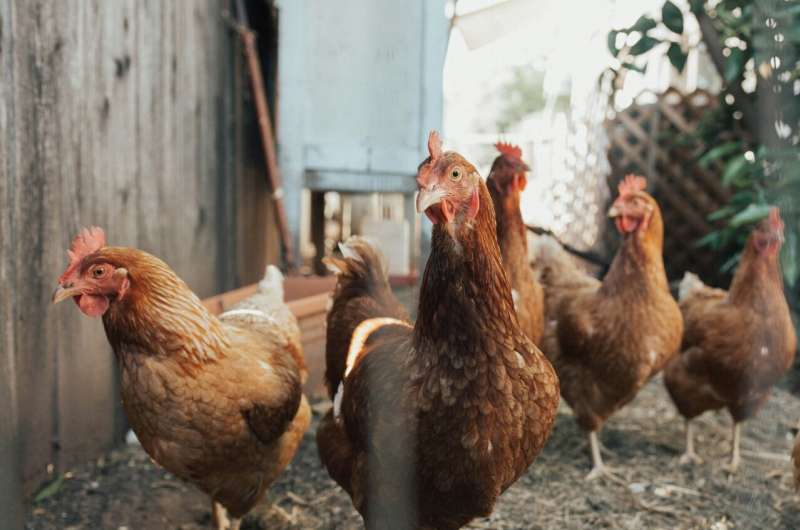Science
Antimicrobial Peptides Show Promise Against Salmonella in Chickens

A recent study has revealed that antimicrobial peptides can effectively combat Salmonella infections in chickens, offering a potential pathway to enhance food safety and public health. Published in Microbiology Spectrum on November 3, 2025, the research underscores the significance of these peptides as alternatives to traditional antibiotics.
The investigation, led by Gireesh Rajashekara, BVSc, Ph.D., a Professor and Associate Dean for Research and Advanced Studies at the University of Illinois Urbana-Champaign, highlights the ability of antimicrobial peptides not only to eliminate Salmonella but also to target related bacterial pathogens such as E. coli. Rajashekara emphasized, “Antimicrobial peptides have the potential to be alternatives to antibiotics and thereby could mitigate antibiotic resistance.”
Salmonella is a leading cause of foodborne illness in the United States, with chickens and chicken products being primary vectors for human infections. The study aimed to identify effective alternatives to antibiotics for controlling Salmonella in poultry. Antimicrobial peptides, which consist of short chains of amino acids, demonstrate the capacity to kill harmful bacteria while minimizing the risk of developing antibiotic resistance.
To assess the efficacy of these peptides, researchers initially tested them in vitro, discovering a set capable of killing various Salmonella strains. Subsequent experiments confirmed their effectiveness in live chickens. The researchers noted that the peptides exert their antibacterial action by disrupting the membranes of Salmonella cells.
In addition to their effectiveness, these peptides showed resilience when exposed to heat and protease treatments, essential characteristics for their application in the poultry industry. Rajashekara stated, “We identified two antimicrobial peptides that kill many different types of Salmonella and also reduce Salmonella load in chickens.”
This research provides a foundational framework for the development and application of antimicrobial peptides to manage Salmonella in poultry, thereby advancing both food safety and public health. Looking ahead, the research team plans to conduct large-scale trials to evaluate the peptides’ effectiveness in chickens, optimize their delivery methods through water or feed, and further explore additional peptides with anti-Salmonella properties.
The findings underscore the ongoing need to address antibiotic resistance in agriculture and food production. By utilizing antimicrobial peptides, there is potential to improve the overall safety of chicken products while minimizing reliance on traditional antibiotics.
For further details, refer to the full study published in Microbiology Spectrum.
-

 Science2 weeks ago
Science2 weeks agoInterstellar Object 3I/ATLAS Emits Unique Metal Alloy, Says Scientist
-

 Politics3 weeks ago
Politics3 weeks agoAfghan Refugee Detained by ICE After Asylum Hearing in New York
-

 Business3 weeks ago
Business3 weeks agoIconic Sand Dollar Social Club Listed for $3 Million in Folly Beach
-

 Health3 weeks ago
Health3 weeks agoPeptilogics Secures $78 Million to Combat Prosthetic Joint Infections
-

 Science2 weeks ago
Science2 weeks agoResearchers Achieve Fastest Genome Sequencing in Under Four Hours
-

 Lifestyle3 weeks ago
Lifestyle3 weeks agoJump for Good: San Clemente Pier Fundraiser Allows Legal Leaps
-

 Health3 weeks ago
Health3 weeks agoResearcher Uncovers Zika Virus Pathway to Placenta Using Nanotubes
-

 World3 weeks ago
World3 weeks agoUS Passport Ranks Drop Out of Top 10 for First Time Ever
-

 Top Stories2 weeks ago
Top Stories2 weeks agoChicago Symphony Orchestra Dazzles with Berlioz Under Mäkelä
-

 Business3 weeks ago
Business3 weeks agoSan Jose High-Rise Faces Foreclosure Over $182.5 Million Loan
-

 Entertainment3 weeks ago
Entertainment3 weeks agoJennifer Lopez Addresses A-Rod Split in Candid Interview
-

 World3 weeks ago
World3 weeks agoRegional Pilots’ Salaries Surge to Six Figures in 2025









